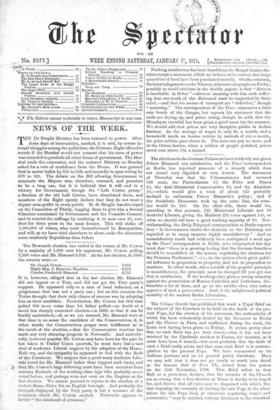The elections fo the German Paliament have evidently not given
Prince Bismarck any satisfaction, and the Times' correspondent at Berlin has reported rumours of a remedy which does not sound very dignified or very honest. The statement of Thursday was that the Ultramontanes had secured 100 seats, the Particularists 10, the Poles and Danes 15, the Anti-Ministerial Conservatives 10, and the Alsatians 10,—which would give a total of about 145 probably inclined to embarrass Prince Bismarck's policy ; and if the Socialistic Democrats took up the same line, the num- ber would be 155. On the other side, there would be, according to this account, 225 Ministerial Liberals and 10 doubtful Liberals, giving the Ministry 235 votes against 155, or what we should call here a good working majority of 80. Not- withstanding, the Daily Telegraph correspondent at Berlin reports that "in Government circles the elections to the Reichstag are regarded as in many respects highly unsatisfactory." And an unsatisfactory result had evidently been anticipated a week ago by the 1Vmes' correspondent at Berlin, who telegraphed this day week that "there is a growing feeling that the German franchise should be remodelled on the system regulating the elections for the Prussian Parliament,"—i.e., on the system which gives politi- cal influence in proportion to property, and not in proportion to numbers. In other words, when a result of the popular principle is unsatisfactory, the principle must be changed till you get one that is satisfactory. If the working-class gives a strong minority against the persecution of Roman Catholics and Lutherans, dis- franchise a lot of them, and go to the middle-class, who rather approve of such a persecution. Such is the enlightened political morality of the modern Berlin Liberalism.


































